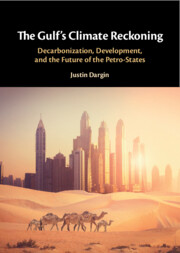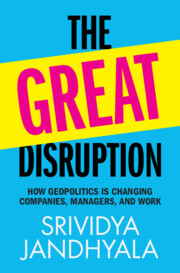Refine search
Actions for selected content:
165 results
8 - Geopolitics and Jurisdictional Arbitrage
-
- Book:
- Profit and Power
- Print publication:
- 22 January 2026, pp 170-176
-
- Chapter
- Export citation
13 - A Unicorn under Sanctions: The Case of Yandex
-
-
- Book:
- Unicorns from Emerging Economies
- Published online:
- 05 December 2025
- Print publication:
- 08 January 2026, pp 357-375
-
- Chapter
- Export citation
Pakistani conflictual world-making in international politics: The Afghan–Soviet War, Cold War counter-insurgency, and the struggles for decolonisation
-
- Journal:
- Review of International Studies , First View
- Published online by Cambridge University Press:
- 17 December 2025, pp. 1-22
-
- Article
-
- You have access
- Open access
- HTML
- Export citation
24 - The Poetry of Antarctica
-
-
- Book:
- The Cambridge History of Australian Poetry
- Published online:
- 19 November 2025
- Print publication:
- 11 December 2025, pp 457-475
-
- Chapter
- Export citation
Chapter 21 - The People, the Masses, and the Educated Elite; or, Democracy in the Age of the Internet
- from Part V - The People Now
-
-
- Book:
- 'The People' and British Literature
- Published online:
- 11 December 2025
- Print publication:
- 11 December 2025, pp 340-356
-
- Chapter
- Export citation
2 - Theorising the State and Transitions
-
- Book:
- States of Transition
- Published online:
- 31 October 2025
- Print publication:
- 13 November 2025, pp 25-58
-
- Chapter
- Export citation

The Gulf's Climate Reckoning
- Decarbonization, Development, and the Future of the Petro-States
-
- Published online:
- 13 October 2025
- Print publication:
- 30 October 2025
The securitization of competition in the European Union
-
- Journal:
- European Law Open ,
- Published online by Cambridge University Press:
- 02 October 2025, pp. 1-16
-
- Article
-
- You have access
- Open access
- HTML
- Export citation
Chapter 1 - Security Dilemmas
-
- Book:
- Security, Fiscal Policy, and Sovereignty in Renaissance English Literature
- Published online:
- 04 September 2025
- Print publication:
- 18 September 2025, pp 1-31
-
- Chapter
- Export citation

Security, Fiscal Policy, and Sovereignty in Renaissance English Literature
-
- Published online:
- 04 September 2025
- Print publication:
- 18 September 2025
Investing From the Heart: The Influence of Home Country Political Sentiment on Cross-Border Venture Capital Investment
-
- Journal:
- Management and Organization Review , First View
- Published online by Cambridge University Press:
- 04 August 2025, pp. 1-34
-
- Article
- Export citation
Conclusion
-
- Book:
- The Law and Politics of International Legitimacy
- Published online:
- 14 July 2025
- Print publication:
- 24 July 2025, pp 488-491
-
- Chapter
- Export citation
2 - Orders in Transition and Implications for Political Legitimacy
- from Part I - Setting the Stage
-
- Book:
- The Law and Politics of International Legitimacy
- Published online:
- 14 July 2025
- Print publication:
- 24 July 2025, pp 24-38
-
- Chapter
- Export citation
Techno-natalism: Geopolitical and socioeconomic implications of emerging reproductive technologies in a world of sub-replacement fertility
-
- Journal:
- Politics and the Life Sciences / Volume 44 / Issue 2 / Fall 2025
- Published online by Cambridge University Press:
- 16 July 2025, pp. 260-279
-
- Article
-
- You have access
- Open access
- HTML
- Export citation
Explaining geopolitical inventiveness: Late colonialism, decolonization, and the Cold War (1945–1970)
-
- Journal:
- Social Science History / Volume 49 / Issue 4 / Winter 2025
- Published online by Cambridge University Press:
- 16 July 2025, pp. 908-932
- Print publication:
- Winter 2025
-
- Article
-
- You have access
- Open access
- HTML
- Export citation
Geopolitics and the Rise of German-Czech Antagonism 1839–1848
-
- Journal:
- Nationalities Papers / Volume 53 / Issue 6 / November 2025
- Published online by Cambridge University Press:
- 04 July 2025, pp. 1415-1436
-
- Article
-
- You have access
- Open access
- HTML
- Export citation
3 - Preferences for Trading Partners
-
-
- Book:
- Globalization in Latin America
- Published online:
- 09 June 2025
- Print publication:
- 26 June 2025, pp 36-55
-
- Chapter
-
- You have access
- Open access
- HTML
- Export citation
What is “the global”?: reassembling how international lawyers see space and time
-
- Journal:
- International Journal of Law in Context / Volume 21 / Issue 2 / June 2025
- Published online by Cambridge University Press:
- 18 June 2025, pp. 203-212
-
- Article
-
- You have access
- Open access
- HTML
- Export citation
12 - Money in the Global Power Game
-
- Book:
- Money In Crisis
- Published online:
- 15 July 2025
- Print publication:
- 12 June 2025, pp 304-334
-
- Chapter
- Export citation

The Great Disruption
- How Geopolitics is Changing Companies, Managers, and Work
-
- Published online:
- 05 June 2025
- Print publication:
- 19 June 2025
